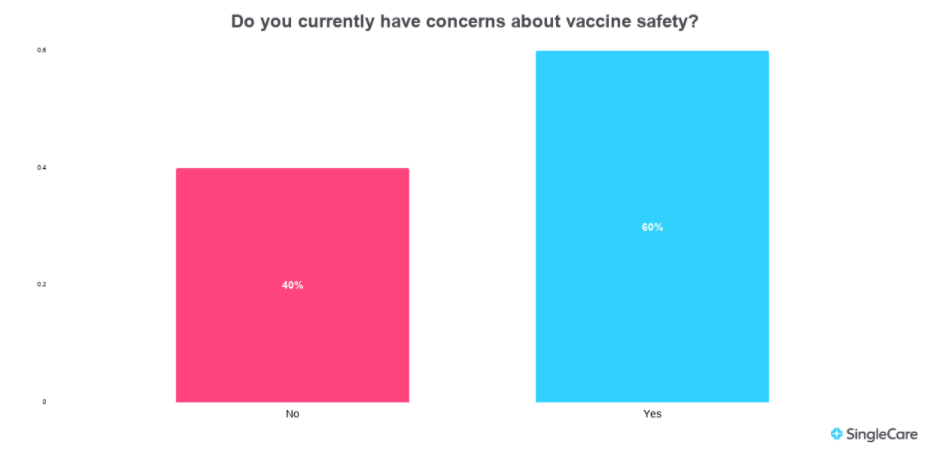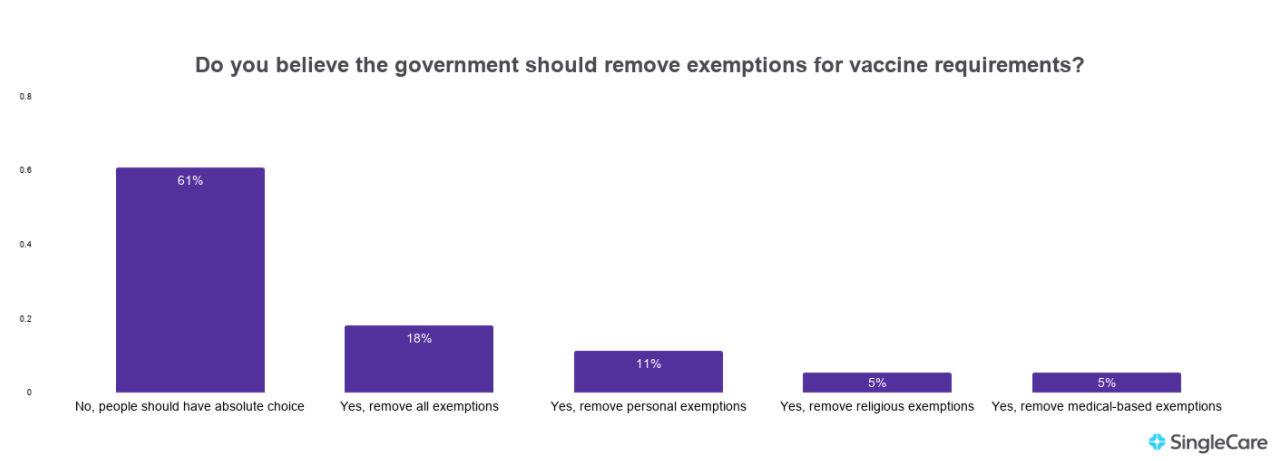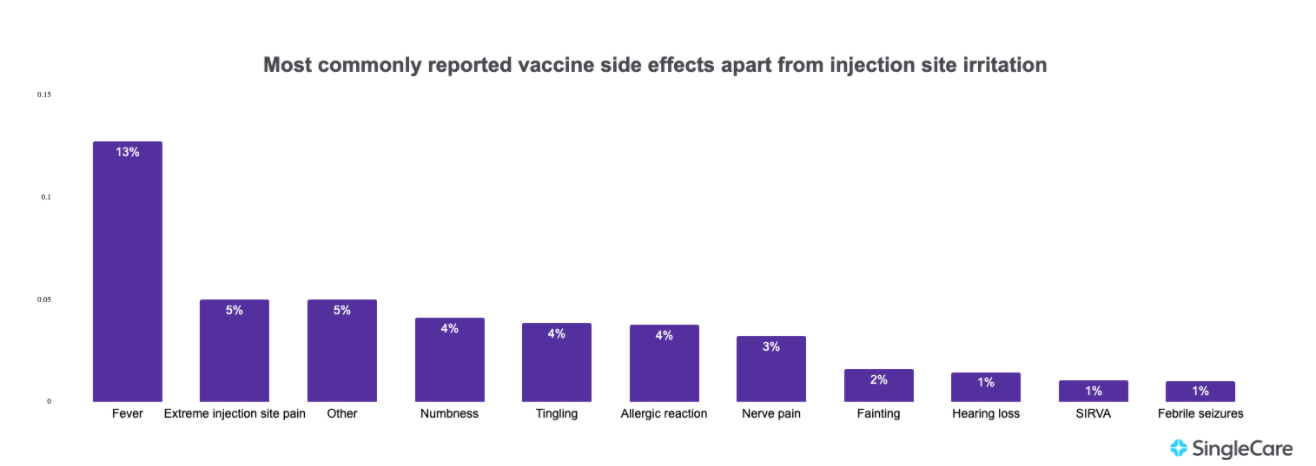The rapid development and early stages of distribution of the new COVID-19 vaccines have put vaccine safety under a microscope. In 2019, prior to the novel coronavirus pandemic, the World Health Organization listed vaccine hesitancy as one of the greatest threats to global and public health. That same year, the American Osteopathic Association conducted a survey that revealed nearly half (45%) of Americans doubted vaccine safety. Our 2020 flu shot survey found similar results with 42% of respondents reporting that they did not plan to get a flu shot this season. In December 2020, six days after the FDA issued an Emergency Use Authorization (EUA) for the second coronavirus vaccine, SingleCare conducted a separate vaccination survey with 2,000 Americans to gauge the perception of vaccine safety and whether vaccinations should be required in the United States.
RELATED: Vaccine statistics
Key findings:
- 26% of respondents are not up to date on routine vaccinations.
- 14% of respondents don’t get any vaccines at all.
- 77% of respondents have not experienced vaccine side effects.
- 60% of respondents have concerns about vaccine safety.
- 45% of respondents don’t research vaccines before getting them.
- 33% do not ask their doctor any questions before getting vaccinated.
- 40% of respondents believe the government should remove at least some exemptions for vaccine requirements.
- 71% of respondents believe children should be required to receive all required vaccinations to attend public schools.
26% of respondents are not up to date on routine vaccinations
While the majority were reportedly up to date on at least some routine vaccinations, a quarter of respondents were not. The U.S. Centers for Disease Control and Prevention (CDC) issues recommendations of vaccinations by age group. Per CDC recommendations, adults aged 19 and older should have the following vaccinations:
| Adult immunization schedule for ages 19 years or older | |
|---|---|
| Vaccine | CDC recommendation* |
| Influenza | Annual flu shot |
| Tetanus, diphtheria, pertussis (Tdap or Td) | 1 dose per pregnancy; or 1 dose + booster every 10 years |
| Measles, mumps, rubella (MMR) | 1-2 doses depending on indication if born in 1957 or later |
| Varicella (chickenpox) | 2 doses if born in 1980 or later |
| Pneumococcal conjugate | 1 dose |
| Pneumococcal polysaccharide | 1-2 doses depending on indication |
| Human papillomavirus (HPV) | 2-3 doses depending on age at initial vaccination or condition |
| Shingles | 2 doses after age 60 |
| Hepatitis A (HepA) | 2-3 doses depending on vaccine |
| Hepatitis B (HepB) | 2-3 doses depending on vaccine |
| Meningococcal A, C, W, Y | 1-2 doses depending on indication + possible boosters |
| Meningococcal B | 2-3 doses depending on vaccine and indication + possible boosters |
| Haemophilus influenzae type B | 1-3 doses depending on indication |
* Recommendations may vary by age, vaccine, and indication. Ask your healthcare provider if you’re missing any routine vaccination for your age group and health condition(s).
14% of respondents don’t get any vaccines at all
We also asked survey-takers whether they or their family get all recommended vaccines according to the recommended schedule. “We” refers to the respondent and their family.
- 56% Yes, we get all recommended vaccinations according to the recommended schedule
- 17% No, we do not get all recommended vaccines
- 14% No, we do not get any vaccines
- 13% No, we get all recommended vaccines but not at the recommended schedule
77% of respondents have not experienced vaccine side effects
We asked 2,000 survey takers if they or their family member(s) have experienced side effects of a vaccine apart from the expected injection site irritation. The majority (77%) reportedly had not. Fever was the most common side effect, but it was still reported by only 254 of 2,000 respondents.
- 77% have not experienced side effects to a vaccine
- 13% reported getting a fever from a vaccine
- 5% experienced extreme pain at injection site
- 5% reported other side effects (including Bell’s palsy, Guillain Barre syndrome, autoimmune disorders)
- 4% reported numbness
- 4% reported tingling
- 4% reported allergic reaction or anaphylaxis
- 3% reported nerve pain
- 2% fainted after receiving a vaccine
- 1% reported hearing loss
- 1% reported shoulder injury related to vaccine administration (SIRVA)
- 1% reported having seizures or febrile seizures
60% of respondents have concerns about vaccine safety
Of the 2,000 respondents, 1,193 reported at least some concerns about vaccine safety. We did not ask survey takers the reasons behind their concerns, but the CDC addresses some common concerns on its website. These concerns include vaccine additives, autism and vaccines, febrile seizures, Guillain-Barre syndrome, and vaccines during pregnancy.
- 40% Do not have any concerns about vaccine safety
- 36% Have some concerns about vaccine safety
- 24% Have significant concerns about vaccine safety
Additionally, 66% of respondents who reported having significant concerns about vaccine safety also reported that they have not experienced side effects of a vaccine.
However, the majority of respondents who are concerned about vaccine safety still get vaccinated or get their children vaccinated
Although 60% of respondents reported vaccine safety concerns, only 37% of them (445 people) reported that their concerns prevented them from getting vaccinated or getting their child vaccinated.
- 63% No, concerns about vaccine safety have not prevented me or my children from getting vaccinated
- 37% Yes, concerns about vaccine safety have prevented me or my children from getting vaccinated
45% of respondents don’t research vaccines before getting them
The rate of vaccine research that respondents reported is split nearly 50/50. Slightly more respondents reportedly research vaccines before getting vaccinated or before their family members are vaccinated.
- 55% Yes, I research vaccines before I or my family gets them
- 45% No, I do not research vaccines before I or my family gets them
Of the 14% who reportedly do not get any vaccines, 47% reportedly research vaccines. Of the additional 17% who reportedly get some but not all recommended vaccines, 63% reportedly research vaccines. Finally, of the 445 respondents who reported their vaccine safety concerns prevent them from getting vaccinated, 77% reportedly research vaccines.
Top sources of vaccine information
Respondents reported receiving vaccine information from the following sources:
- 58% Speaking to a medical professional
- 39% Online articles
- 28% Academic or clinical research and studies
- 24% Friends and family
- 23% Pharmaceutical industry news or manufacturer literature
- 16% do not research vaccine information
- 9% Social media
- 3% Other (CDC, the news, TV or radio reports, advertisements)
Of those who reported having significant concerns about vaccine safety:
- 51% get their vaccine information from medical professionals
- 51% get their vaccine information from online articles
- 34% get their vaccine information from friends and family
- 17% get their vaccine information from social media
- 14% do not research vaccine information
- 5% get their vaccine information from other sources
33% do not ask their doctor any questions before getting vaccinated
We asked survey respondents whether they asked their doctor questions about a vaccine before getting vaccinated. Vaccine safety was the most commonly reported question. Effectiveness and mechanism of action followed. However, a third of respondents reported that they do not ask their healthcare providers any questions about vaccines before they or their family receive a vaccination.
- 50% Yes, I asked about the safety of the vaccine
- 36% Yes, I asked about the effectiveness of the vaccine
- 32% Yes, I asked about how the vaccine works
- 33% No, I have not asked my doctor any questions about vaccines
Of the 33% who reportedly do not ask questions about vaccines 27% (179 people) also reported that they do not get any vaccines at all. However, 73% (484 people) of those who do not ask questions about vaccines also reported that they and/or their family receive at least some recommended vaccines.
40% of respondents believe the government should remove at least some exemptions for vaccine requirements
Currently, vaccine requirements vary by state. State laws establish requirements for school children, which apply to children who attend public and private schools as well as daycare facilities. All states provide medical exemptions and some also have religious and/or philosophical exemptions. Most adults in America are not required to get vaccinated except state healthcare workers. More healthcare facilities are requiring their healthcare workers to be vaccinated for certain vaccine-preventable diseases. We asked our survey takers whether the U.S. government should remove exemptions for required vaccines.
- 61% No, people should have absolute choice over what vaccines they receive
- 18% Yes, the government should remove all exemptions for required vaccines
- 11% Yes, the government should remove personal choice exemptions
- 5% Yes, the government should remove religious exemptions
- 5% Yes, the government should remove medical-based exemptions
We found that more male respondents (22%) than female respondents (14%) believe the government should remove all exemptions for required vaccines.
Additionally, 20% of respondents with no children believe the government should remove all exemptions for required vaccines.
71% of respondents believe children should be required to receive all required vaccinations to attend public schools
- 49% Yes, except for medical exemptions
- 29% No, parents should be able to decide what vaccinations their children receive
- 22% Yes, in all circumstances
A quarter (24%) of respondents with no children reported that children should be required to receive required vaccinations to attend public schools in all circumstances.
Additionally, 32% of respondents who are not up to date on their routine vaccinations believe children should be required to receive required vaccinations to attend public schools except for medical exemptions.
Methodology:
SingleCare conducted this vaccine survey online through AYTM on Dec. 24, 2020. This national survey includes 2,000 United States residents adults ages 18+. Participant samples were census-balanced to match the U.S. population in age, gender, and U.S. region.












